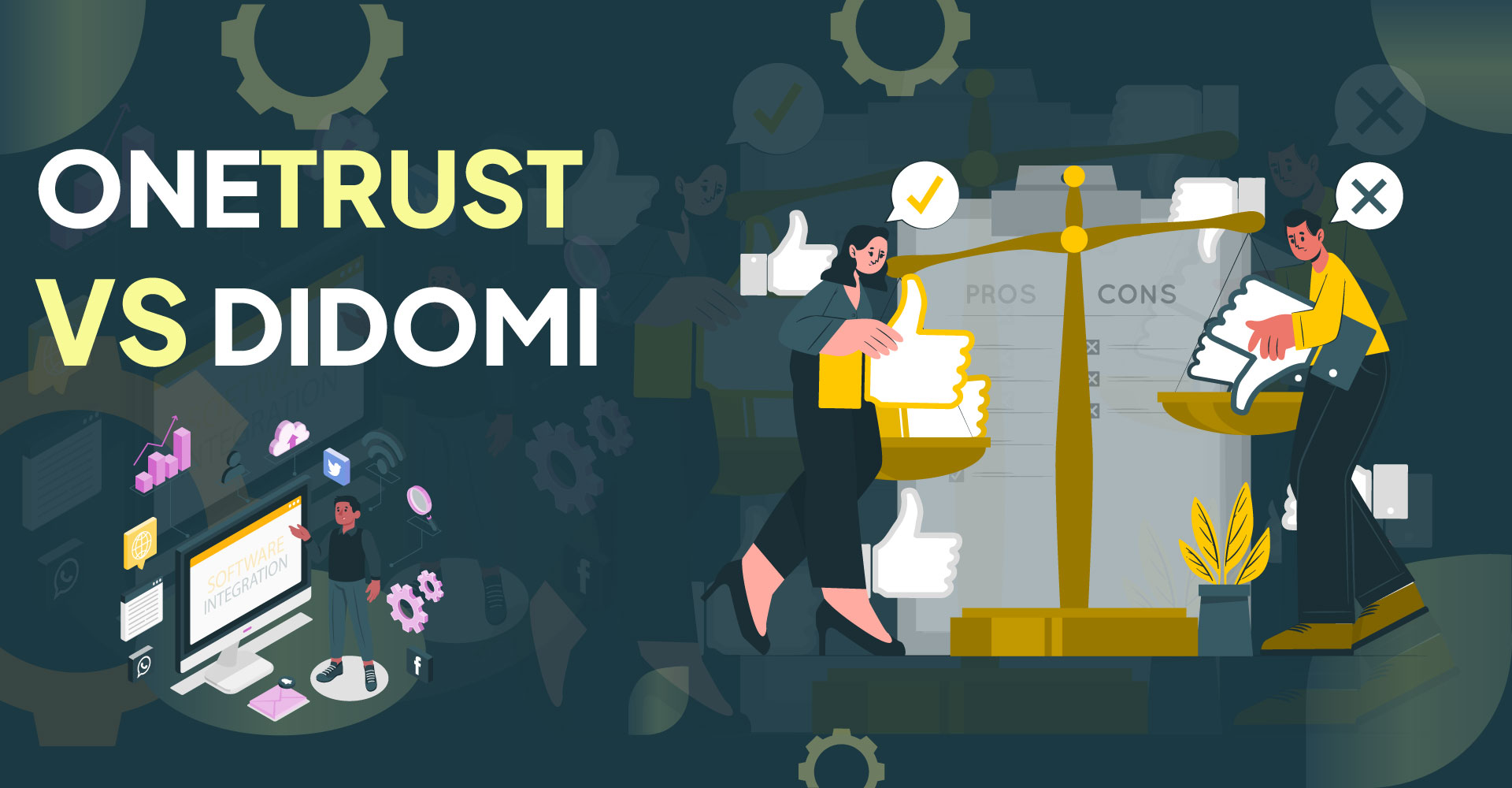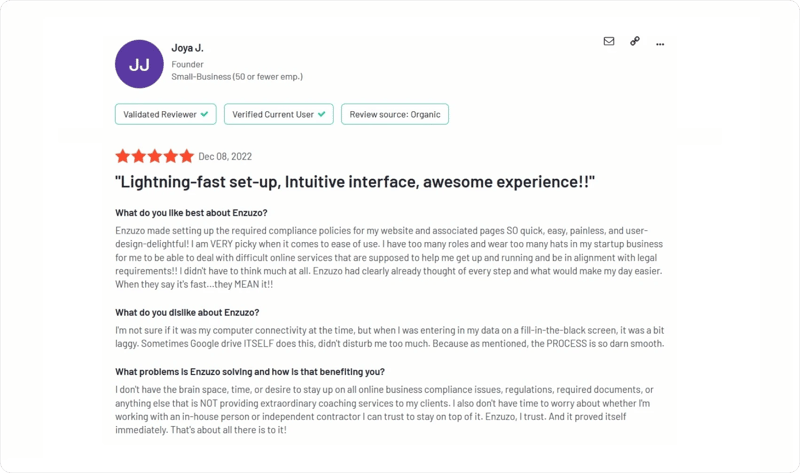OneTrust vs Didomi: What's the Better Choice?

Table of Contents
OneTrust and Didomi are two data privacy platforms that are delivered from the cloud. Despite competing in the same sector, these two providers have constructed very different lists of services. While there is a lot of commonality between these two systems there is a lot of divergence, too.
The main difference between OneTrust and Didomi is that OneTrust offers products beyond regulatory compliance, such as its third-party audit and ethics management tools, whereas Didomi is solely focused on data privacy compliance and consent management.
In this article, we take a look at the main comparison points between OneTrust and Didomi to help you make an informed decision. If neither option is a perfect fit for your needs, we discuss a third option to help you pick a compliance partner.
What are OneTrust and Didomi?
Both OneTrust and Didomi provide tools to simplify data privacy management, helping your organization comply with laws and regulations such as Europe’s GDPR, California’s CCPA, and more.
OneTrust was founded in 2016 in response to growing demand by businesses for assistance and tools for complying with the EU’s GDPR. CEO Kabir Barday and team further enhanced the company’s offerings with the passage of California’s Consumer Privacy Act in 2018 and the ensuing increase in requests for privacy and security software tools.
OneTrust’s suite of services includes data mapping assessments, risk evaluation, consent management, cookie compliance, and more. It has grown its portfolio both organically and by acquisition of companies such as DataGuidance, Integris, Docuvision, Tugboat Logic, and Planetly.
Headquartered in France, Didomi was founded in 2017 by Romain Gauthier, (CEO), Jawad Stouli (CTO), and Raphaël Boukris (CRO). DIdomi’s product offerings include a consent management platform, compliance monitoring, a privacy request management module, and a preference management platform.
At first glance, OneTrust and Didomi have similar product offerings for managing compliance. However, the two solutions offer radically different price points, features, customer support, and more. Let’s take a look at them.
OneTrust Pros and Cons
The list of services offered by OneTrust is so long that the provider has divided them up into four sections, which it refers to as “clouds.” The extensive capabilities of the platform explain how OneTrust has become the leading data privacy management system in the world. The four clouds are:
1. Privacy and Data Governance
OneTrust’s Privacy and Data Governance solutions give you real-time knowledge regarding the personal data held and processed by your organization and third-party vendors. This feature helps you maintain compliance with regulatory requirements around the world.
This cloud includes all of the functions that Didomi offers, so when comparing OneTrust to Didomi, it is only fair to focus just on these functions. In fact, just the Privacy and Data Governance cloud includes many more services than the entire Didomi platform.
OneTrust aims for large clients, but the company realized that it was missing out on many customers. So, it repackages the functions in this cloud for use by companies with less than 500 employees. In this guise, the Privacy and Data Governance cloud is called OneTrust Pro. The company also markets the OneTrust Pro system at cheaper prices under the name CookiePro.
2. ESG and Sustainability
The ESG and Sustainability cloud includes two modules: ESG Program Management and the Supplier Sustainability and Responsibility service. This cloud provides systems to measure a company’s desired aim to meet “environment, social, and governance” goals. This unit has no equivalent on the Didomi platform.
3. GRC and Security Assurance
OneTrust’s GRC and Security Assurance cloud is concerned with risk and audits to ensure that data privacy standards are being followed correctly. The cloud includes three units. These are:
- Technology Risk and Compliance
- Third-Party Risk
- Internal Audit Management
Technology Risk and Compliance examines your IT system's settings and examines whether they leave gaps that could allow data access controls to be bypassed. Internal Audit Management confirms that all potential loopholes have been closed and that the system is operating securely.
The Third-Party Risk unit does have an equivalent in the Didomi platform. However, these two providers have completely different definitions for this task and implement it in different ways. For OneTrust, this process involves researching all suppliers to record any recent data breaches that broke their own data protection controls. Companies that discover poor data privacy in a supplier should decide whether to switch to another provider for those services or write a contract in which the supplier pledges to improve its controls and insure against breaches.
4. Ethics and Compliance
The Ethics and Compliance cloud from OneTrust has no competition from Didomi. This group of services has three modules:
- Ethics Program Management
- Speak-Up Program Management
- Third-Party Due Diligence
The units here are intended for companies that want to enhance their public image by imposing in themselves a higher moral standard of operations that is actually required by the law.
Company managers in businesses that espouse moral goals are sometimes placed in the impossible position of still having to meet profitability targets and so will be tempted to cut corners on morality to keep to their performance obligations. The Speak-Up Program Management unit is intended to keep departments on message by enabling low-level employees to become whistleblowers.
Pros of OneTrust:
- Data privacy standards compliance for a long list of regulations, including GDPR, CCPA/CPRA, HIPAA, PCI DSS, and SOX
- Third-Party Risk Exchange, which is a library of verified risk assessments for more than 70,000 companies
- Hidden deals through the CookiePro brand that offer the high-quality consent and preference management features of OneTrust at much lower prices
Cons of OneTrust:
- Long-term contracts priced at thousands of dollars per month
- Poor and unresponsive customer support
- Complex platform that is difficult to set up and integrate
👉 Looking to evaluate OneTrust? Check out our OneTrust review.
Overall Thoughts on OneTrust
OneTrust manages to cater to all sizes of businesses from mega-corporations with ESG programs down to small eCommerce businesses that just need to cover their legal obligations surrounding cookie consent. The company manages to appeal to different customer types by presenting itself in different brands.
OneTrust grew quickly by buying other companies to add on extra services rather than going through the expensive route of developing them in-house. While this was a good business strategy, it has resulted in a system that is not consistent and connections between modules don’t always work well. Users have noticed that behind the curtain of OneTrust’s brand image lies a collection of poorly integrated units.
The Customer Support team also doesn’t seem able to keep up with the many new units on the platform and often doesn’t have quick answers to hand. Slow response times to user problems is another source of client dissatisfaction. This user’s review of OneTrust’s service is not untypical:
OneTrust can be a great choice for large organizations with large compliance budgets that can rely on in-house IT resources and privacy experts to assist. We estimate that average contract values can be upwards of $50,000, depending on how many features you include in your plan. Moreover, the firm makes it difficult to cancel and charges extra for onboarding assistance.
🏆 Verdict: Suits customers with deep pockets
Didomi Pros and Cons
Didomi is primarily a cookie consent management service. It doesn’t provide tools for discovering and protecting sensitive data on corporate servers. Its services relate solely to websites. However, the Didomi system is not an off-the-shelf solution and potential customers are expected to go through a consultation to get an assessment of their needs.
👉 Read our in-depth Didomi review
The Didomi cloud-based platform provides four modules:
1. Compliance Monitoring
Didomi’s compliance monitoring tool tracks your own organization’s privacy compliance as well as that of your third-party vendors, giving you a 360-degree view of your data compliance status with easy-to-understand key performance indicators. The tool scans a site and identifies each of the cookie-generating elements within it.
The tools third-party risk service is implemented through as site scan as well. This looks for APIs from other companies, such as Google Ads, and categorizes them. This work enables the cookie consent banner to present visitors with a choice of cookie types to consent to. Didomi maintains a database of API suppliers that have experienced data breaches and it will inform you of these events if it detects the cookies of those services within your site.
2. Consent Management
The Consent Management unit of Didomi deals with the cookie consent requirements of a number of data privacy standards. These are GDPR for the EU and the UK, four US regulation frameworks (CPRA, VCDPA, CTDPA, and CPA), Brazil’s LGPD, and Law 25 of Quebec, Canada.
This package will generate a cookie consent banner, allowing you to adjust a few elements of the layout. The service detects the location of each site visitor and serves the appropriate banner in the relevant language. Responses are held on the Didomi server, which relieves the subscriber of the duties of data protection.
The site manager is able to see statistics related to cookie collection but not individual records.
3. Privacy Request Management
In compliance parlance, a request for information by a person on whom data is held is called a “data subject access request,” or DSAR. The Privacy Request Management unit on the Didomi platform handles DSARS.
The subscriber is able to specify the layout of the screens involved in managing the DSAR process. However, all of the mechanisms for the task are hosted on the Didomi platform. As Didomi also holds the consent and preference information about your site’s visitors, all DSAR-related obligations need to be implemented by that company.
4. Preference Management
Preference management is an alternative approach to consent management. Each site visitor registers to set up an account and then gets access to a personal profile page. The profile can be acceswsed through your website, but it is actually hosted by Didomi. The user gets the ability to see what consent has been given and revoke it.
The Preference Management module removes all of the need for a DSAR processing service. It can also help encourage users to consent to extra features from your company, such as notifications and emails about special deals.
Pros of Didomi
- Centered on cookie consent systems for websites
- Designed to simplify compliance for small eCommerce businesses
- Cookie consent banners that detect the site visitor’s location and change the language and wording accordingly
Cons of Didomi
- Poor support for IAB TCF
- Less mature product
- Degrades website performance
👉 Evaluating Didomi? Read our blog on the best Didomi alternatives.
Overall Thoughts on Didomi
Didomi is an up-and-coming player in the data compliance space with a compelling, if limited, product offering. Online reviews show that customers give high marks to Didomi’s customer and technical support.
One important complaint about Didomi from the online reviews is how it can negatively impact the performance of your website. Depending on the size and complexity of your site and the amount of traffic this can be a difficult problem that affects your customers’ experience.
Another important shortcoming of Didomi is a lack of integration support for the popular Shopify CRM platform.
Didomi is less expensive than OneTrust, however, the platform has a lot fewer services than OneTrust’s four clouds. This system is focused on managing visitor cookie consent for websites. OneTrust presents a more competitive price list for these services in its CookiePro brand.
Some Didomi reviews point to how the app adds technical weight to a website, thereby increasing load times, decreasing speed, and impairing core web vitals. This can prove to be a drag on SEO and conversion rates.
🏆 Verdict: Needs careful evaluation before a purchase decision.
OneTrust vs. Didomi: Who Comes Out on Top?
Comparing data compliance platforms is, of course, a moving target—everyone is updating and enhancing their products and adding new ones. For our purposes, let’s take a snapshot in time to compare OneTrust and Didomi:
Features
The extensive menu of product offerings from OneTrust makes it one-stop shopping for all things related to data compliance and adjacent business processes. OneTrust goes far beyond Didomi’s offerings, helping organizations achieve compliance with ESG goals, analysis and response to cybersecurity threats, and more.
Winner on Features: OneTrust ✅
Support
OneTrust has an unfortunate reputation for sub-par customer support, whereas the consensus among Didomi customers is that their customer and product support are first-rate.
Winner on Support: Didomi ✅
Product Maturity
OneTrust has a bit of a head start here compared with Didomi. Not only is its product suite more extensive (as noted earlier), OneTrust appears to support more integrations with popular web platforms.
Winner on Product Maturity: OneTrust ✅
Pricing
If your needs are limited to cookie consent , Didomi’s more focused product portfolio and lower prices make it a compelling choice. That said, if your future compliance needs go beyond website functions, OneTrust’s extensive product line mean that you can cover all of your compliance requirements with just one vendor.
In any case, an apples-to-apples pricing comparison of data privacy solutions still favours Didomi, with typical pricing in the hundreds of US dollars per month compared with thousands for OneTrust. A fairer comparison would be between Didomi and the OneTrust CookiePro brand.
Winner on Pricing: Didomi ✅
OneTrust vs Didomi: Consider Enzuzo Instead
Choosing between data privacy software often means making tradeoffs, and a choice between OneTrust and Didomi is no exception, given that each has its unique strengths and weaknesses. However, there’s another option that may provide more of what you’re looking for among the best data privacy solutions: Enzuzo. Here’s why.
1. Robust Enterprise Features
Enzuzo can more than hold its own when compared to both Didomi and OneTrust. Its consent management product accurately sorts and tracks cookies, and displays them according to IP addresses. Enzuzo also offers other enterprise features to comply with GDPR & CCPA, such as data governance, privacy impact assessments, data mapping, and vendor risk management options.
👉 Read How Global Conglomerate Lucy Group Picked Enzuzo As Its Data Privacy Partner [CASE STUDY]
2. Fast Onboarding and Friendly UX
Enzuzo is engineered to be fast, lightweight, and simple to set up. It doesn’t impact core web vitals or SEO scores. What’s more, it can be set up with a couple of lines of Javascript — no complex onboarding needed.
Online reviews consistently point to this advantage of Enzuzo. 👇
3. Affordable, Transparent Pricing
Enzuzo is more affordable than either OneTrust or Didomi, and there are no hidden fees or surprises. A basic plan for small- and medium-sized businesses starts at just US $9 per month for one domain. The Growth Plan, which starts at $29 per month, includes DSARs and a host of other features that will put you on the path to GDPR & CCPA compliance. All Enzuzo plans are available without limits on the number of website visitors, and enterprise features are priced at a discount to both Didomi and OneTrust.
4. Auto-Updating Privacy Policies and Legal Pages

Both OneTrust and Didomi offer privacy templates that you can edit and modify to your liking. The problem with that is you need to be a bit of an expert to know what you’re doing and not accidentally omit critical information.
Enzuzo’s critical legal pages, such as privacy policies are generated programmatically. During your onboarding, you complete a brief questionnaire regarding details about your business. The end result is a customized legal document that’s applicable to your country and the places where you do business.
What’s more, all privacy policies and other legal pages update automatically whenever there are changes in regulatory requirements. There’s no need to generate the document again, Enzuzo handles it on its clients’ behalf.
Learn more about how Enzuzo can assist with your compliance needs. Book one-on-one time with our CEO! 👇

Osman Husain
Osman is the content lead at Enzuzo. He has a background in data privacy management via a two-year role at ExpressVPN and extensive freelance work with cybersecurity and blockchain companies. Osman also holds an MBA from the Toronto Metropolitan University.
